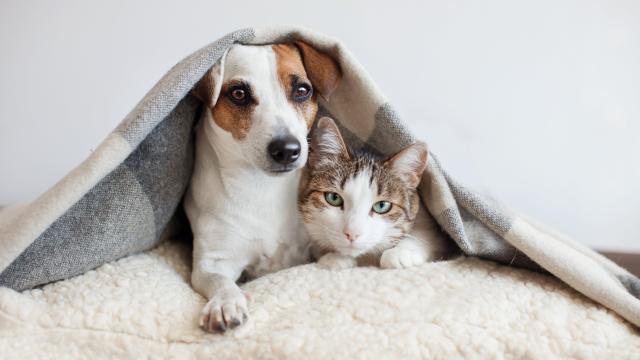New research will provide plenty of fuel to the eternal cats versus dogs debate. The study surveyed pet owners across three European countries and found that dog owners generally seemed to care more about their dogs than cat owners did about their cats. However, the differences in pet attachment varied greatly between countries, and it’s possible that cats could become just as lovable as dogs over time, the researchers say.
The work was led by veterinary scientists from the University of Copenhagen in Denmark. They were inspired by a long-running trend observed in older studies and in their own offices: Dog owners will typically spend more money on veterinary care for their dogs than cat owners will spend on their cats. More recently, however, that trend has started to change in favor of cats. So they wanted to see if people’s attitudes toward the feline persuasion as a beloved companion animal had changed along with it.
“My impression is that, over the past 50 years or so, cats have gone from being completely peripheral animals to going up the ladder,” lead author Peter Sandøe told Gizmodo in a video call. “So if cats are on the way up, the question is: How far will they get? And will they get close to dogs?”
To expand beyond past studies that have examined the question of pet attachment, Sandøe and his team tried to survey a representative sample of pet owners. They also chose to ask people in three countries—Denmark, Austria, and the United Kingdom—allowing them to look for possible cultural factors that could influence our love of these furry companions. Respondents were asked questions about their emotional attachment to their pets and their approach to veterinary care, such as whether they were paying for pet health insurance.
Overall, the team surveyed 2,117 pet owners, including 844 dog owners, 872 cat owners, and 401 people who owned both. Across the board, people scored higher on average in all measures of caring about their dogs than they did about their cats. But these differences were noticeably larger in Denmark than the other two countries, and were very modest in the UK specifically. About 34% of dog owners in the UK said they would be willing to pay a high cost for life-saving medical treatment of their pets, compared to 28% of cat owners, for instance, a difference that wasn’t actually statistically significant. In contrast, 41% of respondents in Denmark said the same for their dogs, compared to 26% of cat owners.
The findings, published Monday in the journal Frontiers in Veterinary Science, suggest that humanity’s love for pets isn’t set in stone and can be influenced by cultural characteristics.
The study authors originally hypothesized that people in Denmark might generally be less familiar with cats in the home than those living in Austria and the UK, for instance, since the country became urbanized relatively later than these countries. This more recent rural history means that cats in Denmark might be more often seen as just another farm or feral animal than they would be in Austria or the UK—a hypothesis supported by the results. But there are likely other factors in play, such as the cost of pet care across countries.
So while dogs might hold the key to our hearts now, cats could very well become just as treasured a pet in the future. It’s also possible that cats nowadays might be more loved than dogs in certain parts of the world, such as Asia, where cats have long been revered culturally and dogs are more often encountered as feral animals. The team hopes they can collaborate with researchers in these other countries to continue studying this enduring popularity contest.
“Looking at these data, there’s no reason to say that dogs will always have the upper paw,” Sandøe noted.
